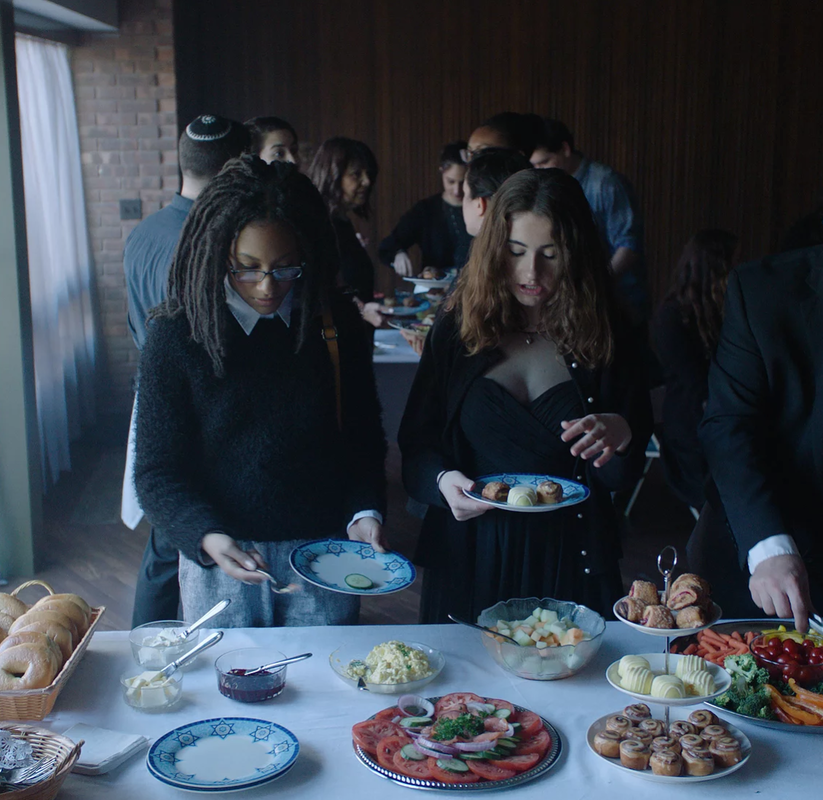|
Review by Sarah Williams “Sometimes it’s painful to be inarticulate,” opens Olivia Peace’s feature directorial debut Tahara. It’s a film that feels like a scrapbook, beginning with a collage of childhood photos and shot in a square ratio, a crafty choice that makes the film’s intercut animated sequences stunning. This animation is sometimes drawn on top of the live action, which is a lovely playful touch. Unlike the opening narrates, Peace’s film is indeed articulate, bringing an honesty to her young characters as they navigate the intersection between grief, Jewish faith, and a queer awakening. After the suicide of a classmate, best friends Hannah (Rachel Sennott) and Carrie (Madeline Grey DeFreece) learn more about themselves and each other. After the funeral, and class-wide ‘Teen Talk-Back’ therapy sessions, the two girls practice kissing on the synagogue bathroom floor. Carrie comes away feeling like she may be in love with her friend. The entire film takes place over the course of a day, moments of teenage heartbreak interspersed between a grieving community. “Then kiss me. Come on, just do it, it’ll be like, a second,” Hannah says. Jess Zeidman’s screenplay is gently realistic, preventing the flashier stylistic decisions from making the film feel cartoonish. The aspect ratio briefly spreads to fill the screen, in a moment akin to an iconic scene in Xavier Dolan’s Mommy, when the two girls kiss for the first time. When they kiss, the girls are replaced by puppets, which are used throughout the film during emotional climaxes. They are uneasy about it, teasing each other, and they don’t come out of the experience feeling the same way. Another layer is added when it is hinted that deceased classmate Samantha may have been a lesbian herself. Carrie begins to speak up for her once she hears the rumors circulated after death, and Hannah tries harder and harder to avoid any association indicating that she could be queer as she tries to capture the attention of classmate Tristan (Daniel Taveras). It’s not to indicate that Hannah doesn’t share the same feelings for Carrie, and maybe even for Samantha — the dynamic makes her character much like the character of Floriane in French lesbian cult-favorite Water Lilies, who has since been heavily discussed as being a lesbian who is repressing her sexuality. The lines between how Hannah and Carrie feel about each other are messy; they don’t define themselves because they are young and still figuring out all these complex issues of faith, grief, and sexuality for the first time. Hannah kisses Carrie again and asks to go further, but it ends up being for Tristan. They argue about sex, and the ethics of it all surrounding the funeral so closely. Carrie at least figures out what she wants that day, but it is clear that Hannah is still struggling to understand herself.
Coming of age so often feels inauthentic, especially when it’s stylized. Here, the teenagers talk like teenagers — they don’t always agree, they tease one another lovingly, and they dig into their own insecurities. They complain about how their school tries to make them confront grief, and they lash out about their feelings. They’re young and they’re still finding out more about themselves, and Hannah still doesn’t even want to approach how she feels, even if Carrie has confronted her. The queer Jewish experience is finally getting its moment in the spotlight, with lesbian drama Disobedience starring Rachel Weisz and Rachel McAdams a few years back also coming to mind. Both films deal with the complications of faith with a same-sex love awakening, but Tahara shows it happening at a much younger age. The film’s title refers to a Jewish ritual act of purifying the body after death. Not only is this discussed in a classroom scene, but the death of a classmate is what purifies the relationship to the simplest shared feelings for the two girls. Unlike Disobedience, Tahara is entirely about the women, not the power structures surrounding them. Sure, they question their faith and how it tells them to grieve, but it is a setting, not a conflict. It’s worth noting that it is a film that comes from the perspective it shows. Screenwriter Jess Zeidman is bisexual and Jewish, and says that she sees herself in both Hannah and Carrie. She and director Olivia Peace (who identifies as queer) discussed both having envisioned the character of Carrie as black, despite it not being explicitly called for in the screenplay, and cast the character as such. It is a lovely step for representation that challenges the ideal of white Jewish characters being the only ones onscreen, and may be the only example I can name of a queer black Jewish teenage girl being allowed to exist on film. It is a lovely bit of truth, and a story that needs to be seen, and the film is made in such an intimate, creative manner that it is hard not to love it. Tahara debuted at the 2020 Slamdance Film Festival which ran January 23-30 in Park City, UT. Rating: 4/5
1 Comment
|
Archives
July 2024
Authors
All
|
|
|
disappointment media
Dedicated to unique and diverse perspectives on cinema! |


